
Aside from its value as a beverage, milk is one of the kitchen's most useful baking ingredients. It adds richness, protein and moisture to many recipes, and buttermilk or soured milk reacts with baking soda to help recipes rise. For vegan bakers or the lactose-intolerant, almond milk is a versatile replacement for dairy milk. It can be used as a direct replacement for regular milk, either fresh or soured.
Almond Milk Basics
Although non-dairy milks might seem to be a modern, highly-processed food, almond milk has a long history. It's been used as a milk substitute for centuries, either because milk was unavailable or on religious fast days when it was forbidden. It's made by soaking almonds overnight in water, then pureeing the soggy kernels with additional cold water and straining out the gritty almond meal. The fats, proteins, calcium and other solids in the nuts form a durable suspension in the water, closely resembling dairy milk in composition. It can be consumed as a cold beverage, added to coffee, poured over cereal and even thickened into custards.
Soured Almond Milk
Many recipes call for buttermilk or deliberately soured milk to complement the baking soda and help the dough or batter rise. The acidity in the milk, whether natural or added by the baker, reacts with the alkaline baking soda to produce bubbles of carbon dioxide gas. The trapped bubbles lift the dough and give it a light and airy texture. Adding an acidic ingredient such as vinegar or lemon juice to almond milk has the same effect, and substituting almond milk will have minimal effect on the volume and lightness of the finished product.
Adjusting the Flavor
If your original recipe called specifically for soured milk and you've substituted plain almond milk, the flavor of your baked goods should be very similar. Almond milk is a less-satisfactory substitute for buttermilk, which adds a distinctively rich tang. Using a good, unfiltered apple cider vinegar to sour the almond milk can help, because the vinegar adds complex, fermented flavors of its own. You can also sour a sweetened or vanilla-flavored almond milk if that's all you have available, but you should slightly reduce the sugar or vanilla in your recipe to compensate.
Other Adjustments
Although almond milk is a close substitute for milk in most respects, its makeup is not entirely identical. Dairy milk is higher in both fat and protein, which can have an effect on the outcome of your baking. If you find that your baked goods are slightly drier and chewier than they should be, increase the fat in your recipe sightly to replace the missing fat in your milk. Baked goods with almond milk tend not to brown as readily, which you can correct by increasing the sugar slightly or -- if appropriate -- brushing the tops of your baked goods with a beaten egg.
Related Articles
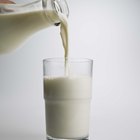
Whole Milk Vs. Lactaid Milk
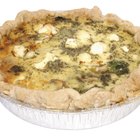
Dairy Substitutes for Quiche

Can I Make Boxed Devil's Food Cake Mix ...

Vegan Coconut Macaroons

How to Make a White Decorator Icing

What Is the Difference Between Raw & ...

Heavy Whipping Cream Vs. Half & Half
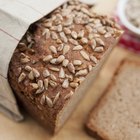
Russian Rye Bread vs. Pumpernickel
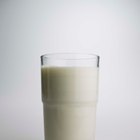
How to Cook With Lactaid
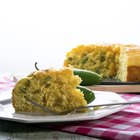
The Purpose of Buttermilk in Baking

Chai Tea Frappuccino Calories

Can You Substitute Applesauce for Eggs ...

Cappuccino Nutrition Information

Can You Substitute Vegetable Shortening ...
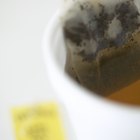
What Makes Homemade Chai Curdle?
Non-Dairy Alternatives for Heavy ...

Can I Substitute Coconut Milk for ...

Substitute for Light Cream in Cooking
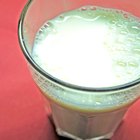
How to Make a Cinnamon Milk Face Mask

Can I Substitute Olive Oil for ...
References
- On Food and Cooking: The Science and Lore of the Kitchen; Harold McGee
- The Joy of Vegan Baking: The Compassionate Cooks' Traditional Treats and Sinful Sweets; Colleen Patrick-Goudreau
Writer Bio
Fred Decker is a trained chef and prolific freelance writer. In previous careers, he sold insurance and mutual funds, and was a longtime retailer. He was educated at Memorial University of Newfoundland and the Northern Alberta Institute of Technology. His articles have appeared on numerous home and garden sites including GoneOutdoors, TheNest and eHow.
Photo Credits
George Doyle/Stockbyte/Getty Images